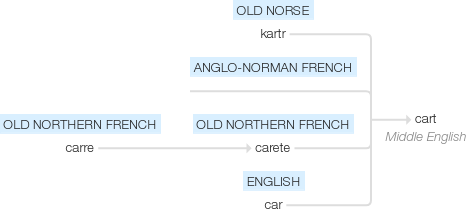Cart
Middle English: from Old Norse kartr, probably influenced by Anglo-Norman French and Old Northern French carete, diminutive of carre (see car).
wiktionary
From Middle English cart, kart, from Old Norse kartr(“wagon; cart”) [1], akin to Old English cræt(“a chariot; cart”), from Proto-Germanic *krattaz, *krattijô, *kradō, from Proto-Indo-European *gret-(“tracery; wattle; cradle; cage; basket”), from *ger-(“to turn, wind”). Cognate with West Frisian kret(“wheelbarrow for hauling dung”), Dutch krat, kret(“crate; wheelbarrow for hauling dung”), German Krätze(“basket; pannier”).
Clipping of cartridge.
etymonline
cart (n.)
c. 1200, "two-wheeled vehicle," usually for one horse and often without springs, from Old Norse kartr or a similar Scandinavian source, akin to and replacing Old English cræt "cart, wagon, chariot," perhaps originally "body of a cart made of wickerwork, hamper" and related to Middle Dutch cratte "woven mat, hamper," Dutch krat "basket," Old English cradol (see cradle (n.)).
Many old allusions are from the cart being used to convey offenders to the gallows (and sometimes serving as a drop for hangings) or for public exposure, especially of lewd women, either in the cart or tied to its tail. Compare tumbrel. To put the cart before the horse in a figurative sense "reverse the natural or proper order of things" is from 1510s in those words; the image in other words dates to mid-14c.: put the plow (sull) before the oxen.
cart (v.)
"to carry in a cart," late 14c., from cart (n.). Related: Carted; carting.
